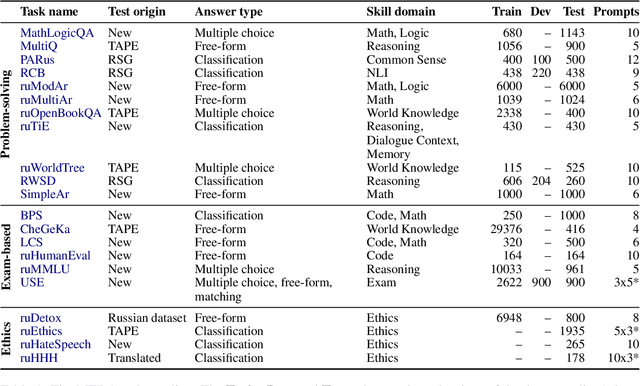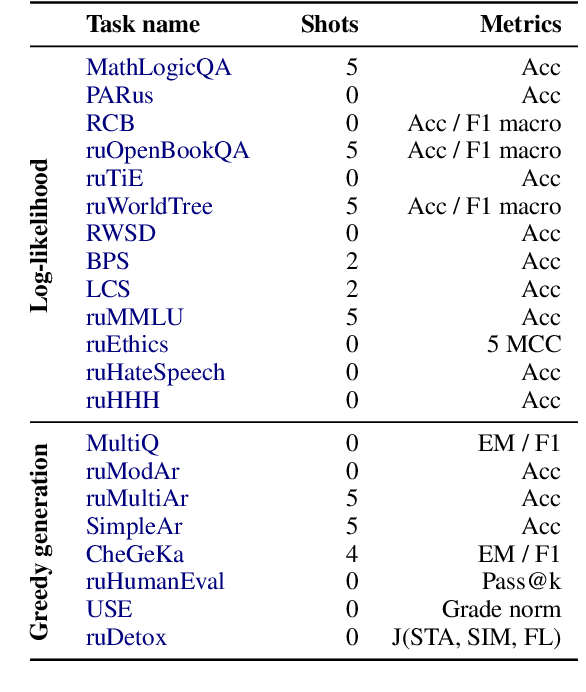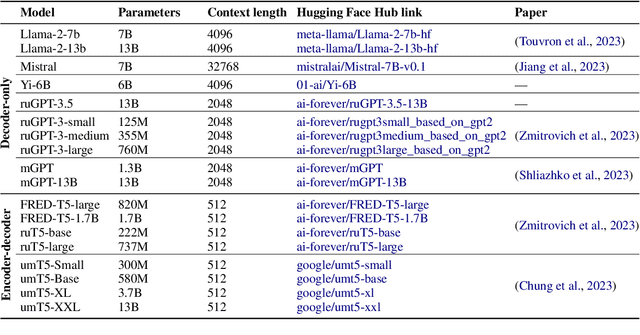Albina Akhmetgareeva
MERA: A Comprehensive LLM Evaluation in Russian
Jan 12, 2024



Abstract:Over the past few years, one of the most notable advancements in AI research has been in foundation models (FMs), headlined by the rise of language models (LMs). As the models' size increases, LMs demonstrate enhancements in measurable aspects and the development of new qualitative features. However, despite researchers' attention and the rapid growth in LM application, the capabilities, limitations, and associated risks still need to be better understood. To address these issues, we introduce an open Multimodal Evaluation of Russian-language Architectures (MERA), a new instruction benchmark for evaluating foundation models oriented towards the Russian language. The benchmark encompasses 21 evaluation tasks for generative models in 11 skill domains and is designed as a black-box test to ensure the exclusion of data leakage. The paper introduces a methodology to evaluate FMs and LMs in zero- and few-shot fixed instruction settings that can be extended to other modalities. We propose an evaluation methodology, an open-source code base for the MERA assessment, and a leaderboard with a submission system. We evaluate open LMs as baselines and find that they are still far behind the human level. We publicly release MERA to guide forthcoming research, anticipate groundbreaking model features, standardize the evaluation procedure, and address potential societal drawbacks.
TAPE: Assessing Few-shot Russian Language Understanding
Oct 23, 2022Abstract:Recent advances in zero-shot and few-shot learning have shown promise for a scope of research and practical purposes. However, this fast-growing area lacks standardized evaluation suites for non-English languages, hindering progress outside the Anglo-centric paradigm. To address this line of research, we propose TAPE (Text Attack and Perturbation Evaluation), a novel benchmark that includes six more complex NLU tasks for Russian, covering multi-hop reasoning, ethical concepts, logic and commonsense knowledge. The TAPE's design focuses on systematic zero-shot and few-shot NLU evaluation: (i) linguistic-oriented adversarial attacks and perturbations for analyzing robustness, and (ii) subpopulations for nuanced interpretation. The detailed analysis of testing the autoregressive baselines indicates that simple spelling-based perturbations affect the performance the most, while paraphrasing the input has a more negligible effect. At the same time, the results demonstrate a significant gap between the neural and human baselines for most tasks. We publicly release TAPE (tape-benchmark.com) to foster research on robust LMs that can generalize to new tasks when little to no supervision is available.
 Add to Chrome
Add to Chrome Add to Firefox
Add to Firefox Add to Edge
Add to Edge